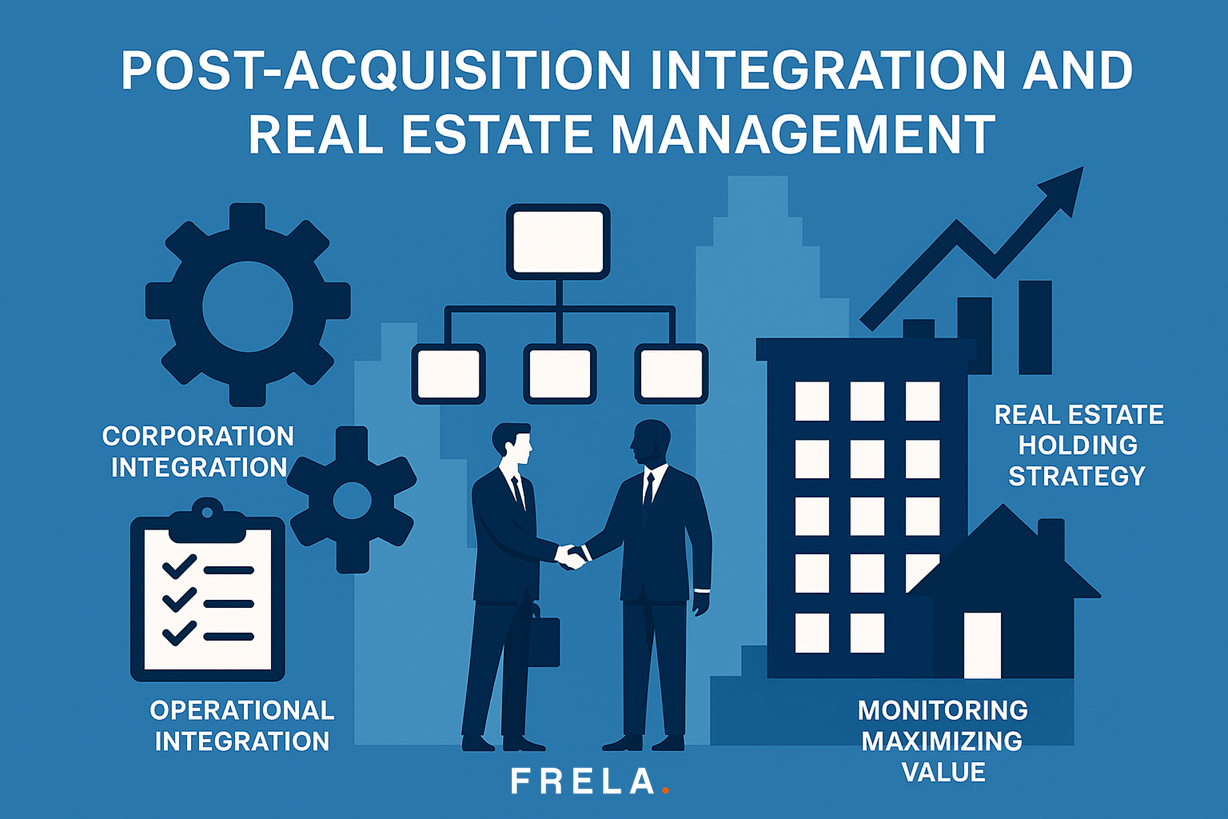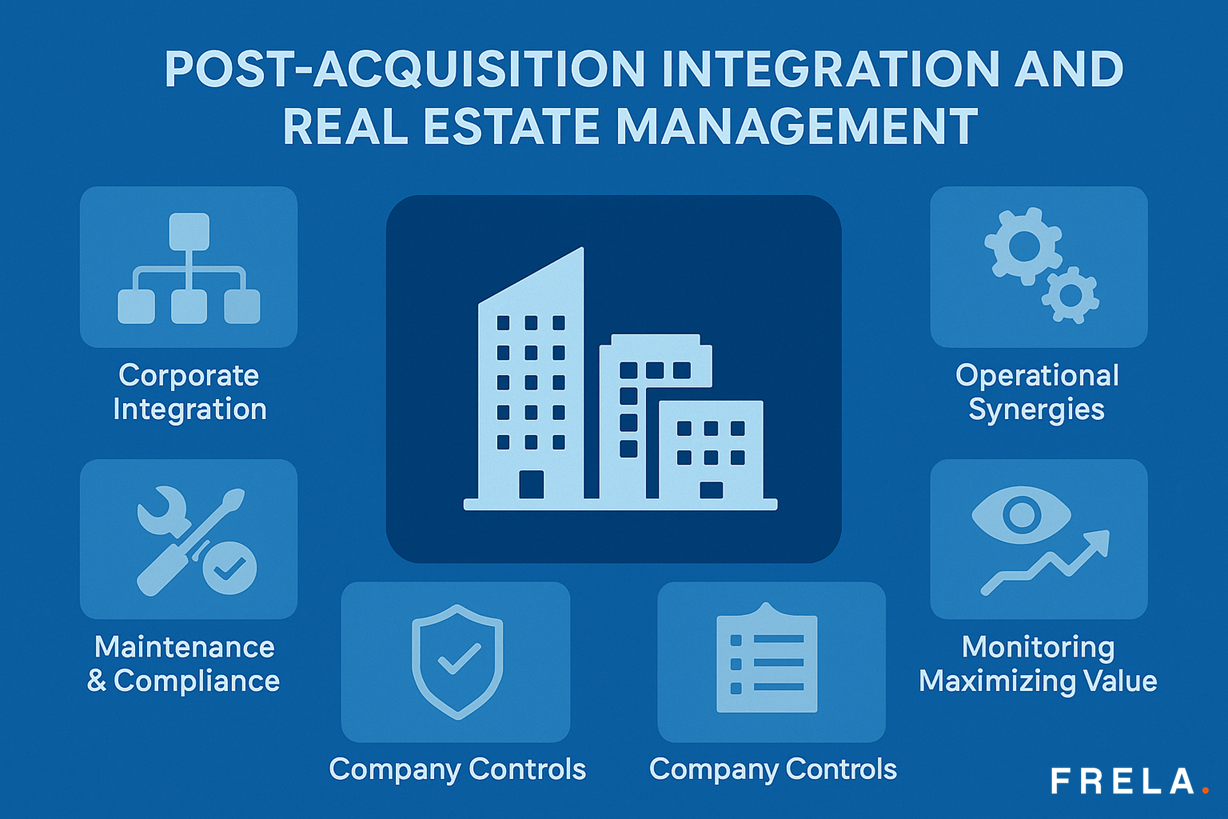Post-Acquisition Integration and Real Estate Management
Once the deal is closed and the foreign investor has acquired the French company, attention turns to post-acquisition integration and how to manage the significant real estate assets within the group’s structure. Several issues and strategies come into play:


Corporate Integration and Restructuring:
The foreign group will need to decide how the French entity fits into its corporate structure. If the acquired company will continue as a standalone subsidiary, integration steps might include consolidating financial reporting, aligning compliance policies (anti-corruption, GDPR, etc.), and possibly changing the company’s name or branding to reflect new ownership. In some cases, groups choose to merge the acquired company into another French entity they already own or combine multiple acquired entities together. Mergers or internal reorganizations (such as spin-offs of certain divisions) can be done relatively smoothly under French law, but careful planning is needed if real estate is involved to avoid unintended tax triggers. A merger of the acquired company into another French company would not trigger transfer taxes on the real estate (mergers are exempt from transfer tax, provided the merger is properly structured under the merger regime), but if within a short time after acquisition the group sells one of the properties externally, it could raise questions of abuse. Thus, integration steps should be aligned with a long-term strategy for the assets.
Real Estate Holding Strategy:
Significant real estate assets raise the question: should the operating company continue to own them, or should they be separated? Some foreign investors prefer an OpCo/PropCo structure, where real estate is owned by a separate property holding company (perhaps for financing reasons or to facilitate future sale-leaseback transactions). Post-acquisition, the group might consider carving out the properties – for instance, contributing the real estate to a wholly-owned French subsidiary (a PropCo) and having the operating company lease them. This can ring-fence property liabilities and potentially allow refinancing the real estate independently. However, any such transfer must be evaluated for tax – a contribution of real estate to a subsidiary could incur the 5% transfer duty unless structured under the favorable regimes (a contribution under the form of a merger or in exchange for shares might qualify for a fixed duty of 125 € if conditions are met). Often groups wait until the acquisition dust settles (and conditions of tax neutrality are clearly met) before doing these transfers. Another strategy is to engage in a sale & leaseback with an external investor: the group sells one or more properties to a third-party investor (e.g. a real estate fund) and the French company or its affiliate leases them back on a long-term lease. This can unlock capital and is quite common for industrial or retail assets. If contemplated, it should ideally be planned after integration to ensure the French business can sustain the rent obligations and that the sale won’t trigger any restrictions (sometimes, FDI approval conditions might limit asset disposals if the asset is integral to a sensitive activity).
Operational Integration and Synergies:
From an operational perspective, the new owner will look to integrate the French sites into its global operations. This could involve consolidating certain facilities if there’s overlap with the group’s other European assets, or investing in the French sites to increase capacity. Logistics and factories often benefit from scale – a foreign investor might, for example, route more production or distribution through the French sites if strategic. Alternatively, they might find some sites redundant and choose to close or sell them. It’s important to be mindful of French labor law if any site closure or reorganization affects employees – France has employee representation and collective dismissal regulations that require consultation and planning.
Maintenance and Compliance Management:
Taking over a portfolio of real estate means taking on ongoing obligations. The new owner should implement a plan for property management – ensuring leases are administered (if there are tenant relationships), maintenance is performed, and all regulatory inspections are up to date (e.g. fire safety checks for commercial buildings, periodic building facade inspections required in some cities, etc.). If any of the sites had pending compliance upgrades (say, to meet new environmental standards or accessibility requirements), the buyer should budget and schedule these. Insurance policies might need to be updated to reflect the new ownership and ensure adequate coverage of the real estate (property damage, liability, business interruption).
Integration of Company Culture and Controls:
Though not a legal requirement, a post-acquisition integration plan usually involves aligning the acquired company’s policies with the group’s. For instance, the foreign investor may introduce its health, safety and environment (HSE) protocols to the French sites, which is particularly important for factories and warehouses to maintain global standards. Real estate assets also bring safety considerations (fire safety systems, evacuation drills, etc.) that should be up to the group’s expectations, especially if the group is in a highly regulated industry.
Monitoring and Maximizing Value:
Over time, the investor will want to maximize the value of the acquired real estate. This could mean redeveloping or expanding facilities (which would involve obtaining new permits – e.g. a building permit for expansion, or an authorization if changing the use of a site). The investor should be aware of French urban planning constraints – for example, adding warehouse space may be limited by local zoning or may require additional parking as per regulations. They should also monitor local developments (a new highway or rail could enhance a site’s value; conversely, new environmental zoning might impose constraints). If any site is underutilized, the company might consider selling part of the land or inviting other users (tenants) – of course, ensuring compliance with any zoning or subdivision rules.
In summary, post-acquisition, the foreign acquirer’s task is to ensure the French business and its real estate are fully and efficiently integrated into the group’s portfolio, both to realize synergies and to manage risks. With careful planning during the deal (through the contractual mechanisms) and after the deal (through strategic restructuring and management), foreign investors can successfully navigate the complexities of acquiring French companies with substantial real estate components and turn those assets into an advantage within their international operations.
Conclusion
Acquiring a French company that owns significant real estate assets is a multifaceted endeavor, requiring careful navigation of French legal specifics. Foreign investors must balance deal structuring to minimize taxes and liabilities, perform in-depth real estate due diligence, comply with foreign investment regulations, and negotiate robust contractual protections. Equally important is planning for a smooth post-acquisition integration of both business operations and property management. By addressing these aspects with the help of experienced French legal and tax advisors, foreign groups can confidently invest in France’s industrial and commercial landscape, leveraging valuable real estate as part of their growth strategy while mitigating the associated risks.
About the Author :
Business lawyers, bilingual, specialized in acquisition law; Benoit Lafourcade is co-founder of Delcade lawyers & solicitors and founder of FRELA; registered as agents in personal and professional real estate transactions. Member of AAMTI (main association of French lawyers and agents).
FRELA : French Real Estate Lawyer Agency, specializing in acquisition law to secure real estate and business transactions in France.
Paris, 15 rue Saussier-Leroy, Paris
Bordeaux, 24 Rue du manège, 33000 Bordeaux
Lille, 40 Theater Square, 59800 Lille

This article is provided for general information only and may not reflect the most recent legal or tax developments. It does not constitute legal advice. Please contact us for personalised guidance before making any decision.




